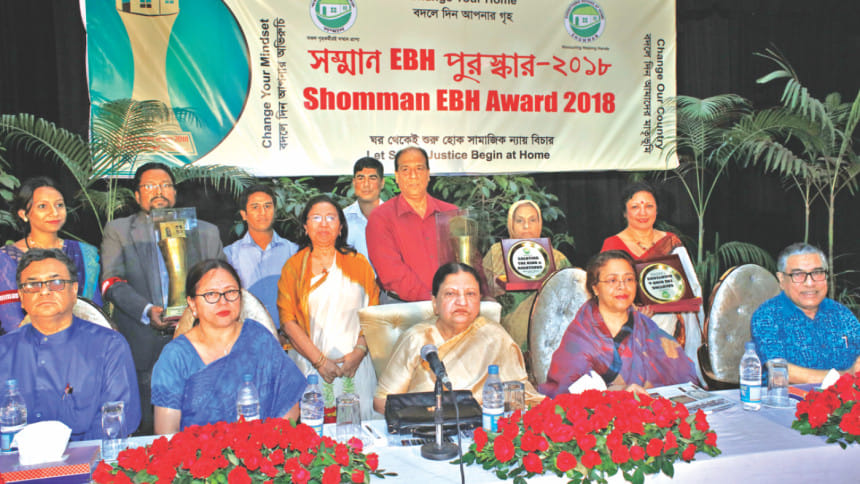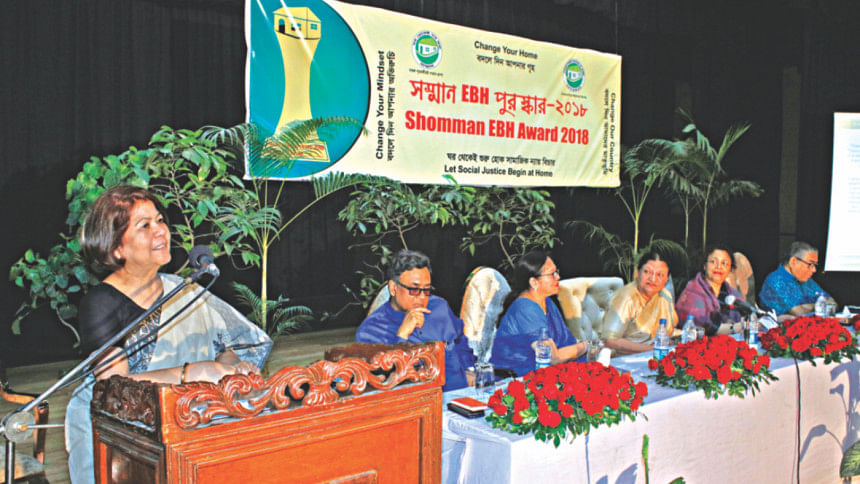For a more humane world

Khairuzzaman Monnu hired Jharna as a domestic help in his house back in 2007. Widowed at an early age, she was given a shelter more than a simple livelihood.
Jharna found a new home and a family, which she started to consider as her own. And Monnu never treated her like anyone else other than his own sister.
“I couldn't do much for her. But I never felt that she isn't my sister,” said Khairuzzaman, the head teacher at a Sirajganj school for persons with intellectual disabilities.
His contribution for this destitute domestic help was recognised yesterday at a programme at the capital's Chhayannaut Sangskriti Bhaban.
In urban areas, helping hands and people doing so-called lowly jobs like gardeners, cooks, and drivers are part of daily living. But their basic rights such as fixed wage, healthcare and proper accommodation are largely overlooked.
Speakers at the programme said the government needs to fulfil the needs of domestic helps under a legal framework. Moreover, a change in the mindset of the employers and their families is also important for the wellbeing of such workers.
On the eve of May Day, Shomman Foundation arranged the ceremony to honour individuals with “Shomman EBH Award 2018”, which was launched this year.
Shaheen Anam, executive director of Manusher Jonno Foundation, also received the award.
Apart from the two awardees, two other persons -- Lutf-e-Tahera, a retired development worker in Dhaka; and Nashid Kamal, a Nazrul researcher -- were honoured in recognition of their humanistic efforts towards domestic helps.
A jury, including Valerie Taylor, founder of Centre for Rehabilitation of the Paralysed (CRP), selected the winners. The criteria were: the awardees employed their domestic helps for at least 10 years, helped them get education and never abused them.
From now on, the award will be given in every two years, said the organisers.
Speaking at the ceremony, noted entrepreneur Rokia Afzal Rahman said the initiative is inspiring, and it will motivate her to contribute more to the society.
Abu Jamil Faisel, senior adviser to USAID Bangladesh, said, “It is our moral duty to respect those who work as helping hands like the cleaners, guards, and cooks.”
Alongside moral obligations, steps have to be taken to institutionalise their rights, he said. “They should start getting facilities like salaries, benefits, and leave, which workers usually enjoy.”
Domestic helps are not registered with any organisation or institution. The Ministry of Labour and Employment or the Ministry of Social Welfare can register them and the process can be started at the ward level, he added.

He also said these people, prone to malnutrition, are largely deprived of proper healthcare and often contract diseases like anaemia and tuberculosis.
Citing a recent study conducted in the capital, he said family members contracted tuberculosis because their housemaid had been suffering from the disease.
Shaheen Anam said recognising the informal sector and the contribution of domestic helps in the existing labour law are needed to ensure their wellbeing.
Their works are yet to be recognised as “risky” in the present “list of risky jobs” in Bangladesh, she said.
“Honouring them is something important. But a proactive role to help them overcome obstacles is more important,” said Shaheen Anam, who has been vocal for domestic helps' rights for more than 15 years.
Putting emphasis on the role of people from all tiers of the society, lawmaker Simeen Hussain Rimi said each and every citizen is needed in the state.
She said changing the mentality like a simple gesture of sympathy towards domestic helps will bring changes in their lives, and this has to be started from home. “Changes can be made in the society if people do their own duties.”
A brief documentary screened by the organisers showed that about 1,200 domestic helps were killed after the Liberation War in 1971.
Referring to frequent abuses of migrant workers abroad, Rubaiul Murshed, founder chairman of Shomman Foundation, said proper remuneration for domestic workers can help them lead a peaceful life at home and avoid a life of abuse in a foreign land.
Sajida Humayun Kabir, patron of SAJIDA Foundation, said creating awareness among people is necessary to eradicate torture against domestic helps.

 For all latest news, follow The Daily Star's Google News channel.
For all latest news, follow The Daily Star's Google News channel. 



Comments